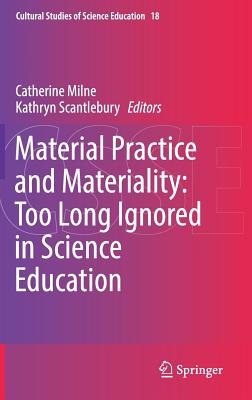Material Practice and Materiality: Too Long Ignored in Science Education
暫譯: 材料實踐與物質性:在科學教育中被忽視的太久
Milne, Catherine, Scantlebury, Kathryn
- 出版商: Springer
- 出版日期: 2019-04-26
- 售價: $5,280
- 貴賓價: 9.8 折 $5,174
- 語言: 英文
- 頁數: 252
- 裝訂: Hardcover - also called cloth, retail trade, or trade
- ISBN: 303001973X
- ISBN-13: 9783030019730
-
相關分類:
材料科學 Meterials
海外代購書籍(需單獨結帳)
相關主題
商品描述
In this book various scholars explore the material in science and science education and its role in scientific practice, such as those practices that are key to the curriculum focuses of science education programs in a number of countries.
As a construct, culture can be understood as material and social practice. This definition is useful for informing researchers' nuanced explorations of the nature of science and inclusive decisions about the practice of science education (Sewell, 1999). As fields of material social practice and worlds of meaning, cultures are contradictory, contested, and weakly bounded. The notion of culture as material social practices leads researchers to accept that material practice is as important as conceptual development (social practice).
However, in education and science education there is a tendency to ignore material practice and to focus on social practice with language as the arbiter of such social practice. Often material practice, such as those associated with scientific instruments and other apparatus, is ignored with instruments understood as "inscription devices", conduits for language rather than sources of material culture in which scientists share "material other than words" (Baird, 2004, p. 7) when they communicate new knowledge and realities. While we do not ignore the role of language in science, we agree with Barad (2003) that perhaps language has too much power and with that power there seems a concomitant loss of interest in exploring how matter and machines (instruments) contribute to both ontology and epistemology in science and science education.商品描述(中文翻譯)
在本書中,各位學者探討了科學及科學教育中的材料及其在科學實踐中的角色,例如這些實踐對於多個國家的科學教育計畫課程重點至關重要。
作為一種建構,文化可以被理解為材料和社會實踐。這一定義對於幫助研究者深入探討科學的本質以及在科學教育實踐中的包容性決策是有用的(Sewell, 1999)。作為材料社會實踐的領域和意義的世界,文化是矛盾的、具爭議的,且邊界模糊。將文化視為材料社會實踐的觀念使研究者接受材料實踐與概念發展(社會實踐)同樣重要。
然而,在教育和科學教育中,往往傾向於忽視材料實踐,並專注於社會實踐,語言被視為這種社會實踐的仲裁者。通常,與科學儀器及其他設備相關的材料實踐被忽視,儀器被理解為「記錄裝置」,是語言的通道,而非科學家在傳達新知識和現實時分享的「非語言材料」(Baird, 2004, p. 7)。雖然我們不忽視語言在科學中的角色,但我們同意Barad(2003)的觀點,即語言或許擁有過多的權力,而隨著這種權力的存在,似乎對於探索物質和機器(儀器)如何對科學及科學教育中的本體論和認識論作出貢獻的興趣也隨之減少。











